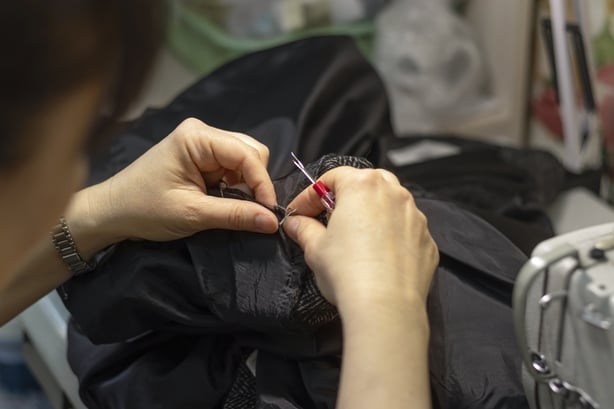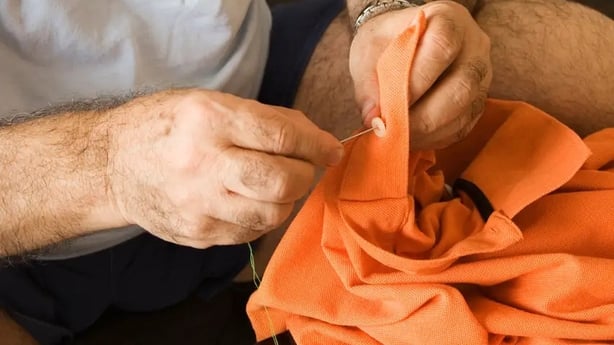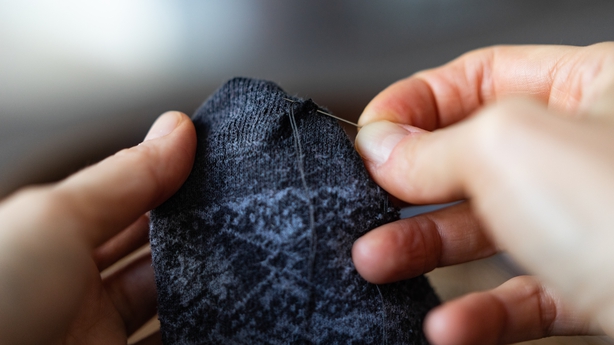Crotch blowout might sound painful, but it's an incredibly common occurrence for some of us: when the crotch of your jeans frays away from over wearing.
It's just one of the side effects of getting the most out of our clothes, as many have turned away from excessive shopping be it for sustainability reasons or to avoid extra spending as the cost of living crisis rolls on.
Ripped shirts, bobbly knits and frayed hems are natural features of wear and tear, but aren't always the nicest things to look at, especially on a beloved piece of clothing. Thankfully, there are ways to mend and repair your clothes to get even longer out of them.

Arran Murphy, Programme Manager of Rediscover Fashion – one of four social enterprises based in the Rediscovery Centre in Ballymun – and Jo Linehan, Editor of the Climate Supplement with The Sunday Times joined Today with Claire Byrne to discuss upcycling our clothes.
Being sustainable with our clothes starts with looking at the items we already have, Murphy says, and seeing if we can mend them.
"Over the past couple of decades, what's happened is we're buying more and more clothes but we're actually wearing them less and less", she said, adding that we all have items we haven't pulled out of the wardrobe in months.
Small flaws with our clothes – such as a hem coming loose or a button falling off – are putting some of us off wearing clothes that are perfectly fine, despite these fixes being very easy to make. "It's a brilliant thing to do to extend the life span of our clothing and get more use out of them", Murphy added.
Linehan added: "It's about not jumping to what we've been taught to do, which is literally when something isn't quite right or something's broken, buying new. That's become the go-to because it's so cheap to buy everything new and really we need to retrain ourselves, there are so many other options."
We've only recently fallen out of the habit of mending, as just a generation or two ago people were used to repairing clothes instead of dumping them. Murphy noted that we've lost the skills that our relatives relied on to preserve our clothes.

"We have been sort of out sourcing these types of things, but there is such a huge amount that you can do with just a simple needle and thread. The skills aren't very far from us."
She pointed to online tutorials on YouTube, which are a free and convenient way to learn these skills like hand stitching. Even if you weren't top of your class in home economics, Murphy said that it shouldn't put you off.
"As with everything, practice makes perfect. The first repair that you attempt mightn't actually be the way you want it to be but with a bit of practice, I started like that, you can achieve great things."
Shoe repairs are one thing Linehan will go to an expert for, but even in that she used her platform online to show how accessible certain repairs can be.
"I had an old pair of heels that I absolutely loved, they were very unloved, the sole had come off and I just decided to bring them to a local person to fix and I documented it, and it was honestly the most popular video that I've had in the last six months.
"Over 25,000 views, people commenting, I was like, guys, we've always repaired shoes! Don't forget that you don't need to buy new, there's someone in your neighbourhood – I think it cost me €5, they were done within 24 hours, ready for the weekend."

Preserving clothes also serves a sentimental purpose, Linehan noted. "That's a large part of the connection that we have with our clothing and our identity."
As for practical tips, Murphy started with bobbly knit jumpers: "You don't pick the bobbles off, that's not a good idea because you can end up pulling the knit. You can get bobble removers, which are like shavers basically ... You can also cut them off with the scissors or with a razor", ensuring that you are careful handling sharp razors.
While some companies are accused of "green-washing" – making false or misleading claims about how sustainable or eco-conscious their products or values are – Linehan also cautions against "green hushing", where companies are so afraid of backlash that they don't speak up about sustainable practices, particularly when it comes to offering repair workshops.
"We do not have time to get into the weeds about this, we are in the middle of a crisis and we need the urgency behind it. I don't care who it is, if someone goes into that store who wouldn't ordinarily think of repairing and they see a repair workshop that's on for free and they sit down and learn how to sew, fantastic."
To listen to the full conversation, click above.

